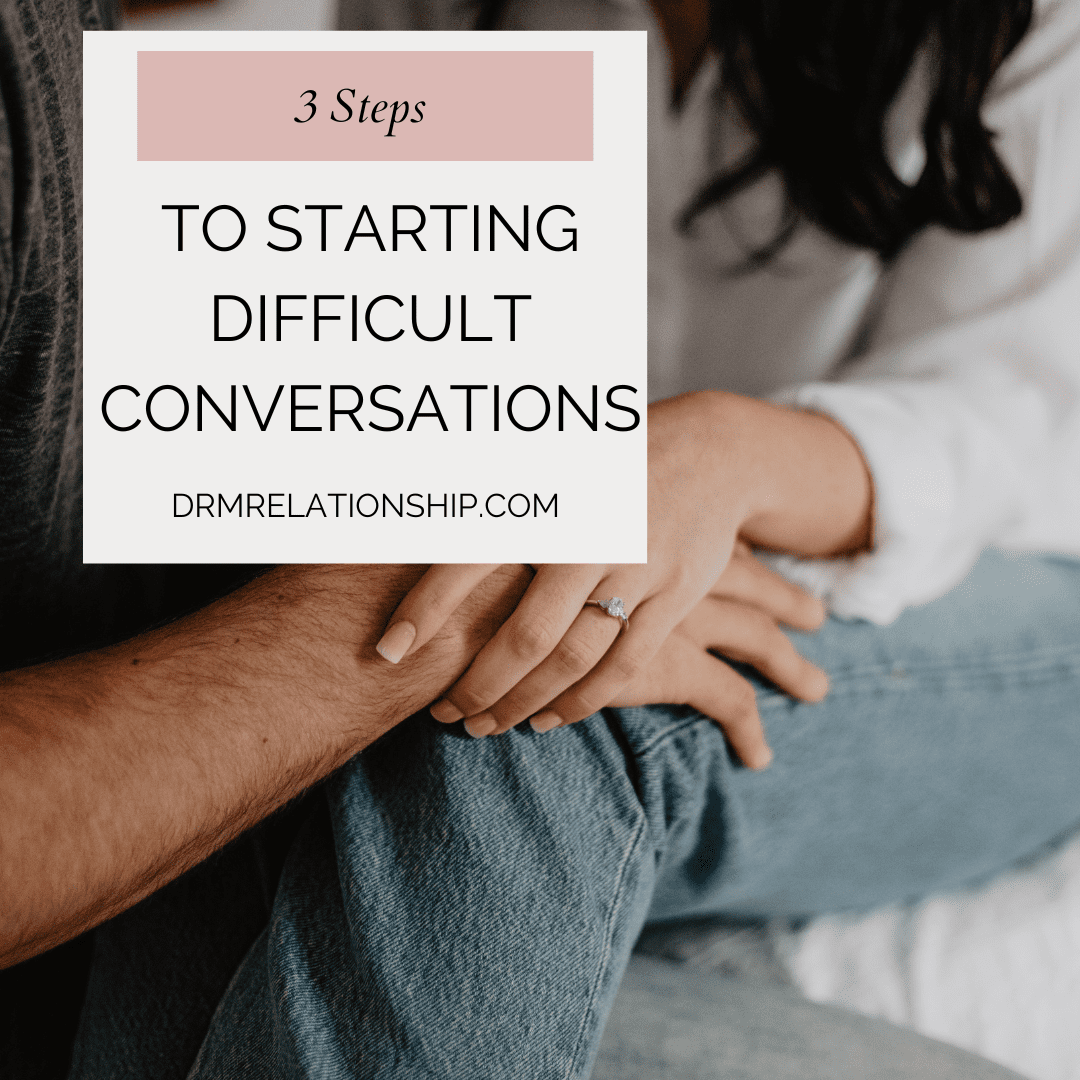
3 Steps
To Starting A Difficult Conversation
Ashley and Michael were arguing about the dishes again. Ashley was pissed that she felt Michael never helps with the dishes and that he always leaves them for her to do. "I can't believe you never help with the dishes," said Ashley, "it's always left for me to do." "I don't know what you're talking about," said Michael, "I help with them all the time." The argument escalated, and they both screamed at each other. Things might have gone differently if they had used a simple technique to start the fight right in the first place.

Human beings tend to be social beings, and most of us interact with others every day of our lives. In Tony Robbin's work, love/ connection is considered one of our basic psychological needs. This need is most evident in those we care about, e.g., our close friendships, family, and significant others. However, because each person in our life has their personality, each personality we deal with is unique and presents its challenges.
Managing the myriad of relationships requires us to consciously observe the process and impact of our interactions so that we continue to gain knowledge, understanding, and experience in developing relationships positively. My relationship with my wife and daughter gave me some of the most profound insights into myself and my emotional maturity. I learned a lot from my daughter, especially from 11 to 17. Right parents? Good communication is critical in any relationship but essential in marriage. When you can effectively communicate with your partner, it builds trust and strengthens your marital bond. Here is a simple technique I learned from Dr.John Gottman that I teach my clients.

So Ashley and Michael came into my office after a colossal blow-up where Ashley couldn't get any reaction from Michael. This problem is not uncommon and is a sure sign that divorce is coming shortly. Ashely and Michael have been married for a few years, but it's gotten out of hand lately. "It is the last straw," as Ashely puts it. They didn't know how to communicate their issues without expressing their frustration and criticizing each other. When someone attacks you with "constructive" criticism, it is natural to become defensive, escalating their fight.
Good communication is critical in any relationship but essential in marriage. When you can effectively communicate with your partner, it builds trust and strengthens your marital bond. Here is a simple technique I learned from Dr.Jhon Gotman that I teach my clients;
When they came to see me, they had the typical pattern, one of the tail-tail signs that Gottman uses to predict divorce by 91% just by observing a couple having a short discussion about something troubling them. Someone throws sarcasm, criticism, and constructive advice because they feel some way, and their partner becomes defensive, often leading to contempt and then silence and resistance. So one of the first communication skills we taught them was a variation of the "soft" start-up.
When they came to see me, they had the typical pattern, one of the tail-tail signs that Gottman uses to predict divorce by 91% just by observing a couple having a short discussion about something troubling them. Someone throws sarcasm, criticism, and constructive advice because they feel some way, and their partner becomes defensive, often leading to contempt and then silence and resistance. So one of the first communication skills we taught them was a variation of the "soft" start-up.
I _____________ ( your first-person subjective experience) about __________ (a SPECIFIC situation) and I think it____...

Step 1 Use "I" Statements
When communicating with your partner, use "I" instead of "you" statements.
I am sure this is not anything new to you. This has been a favorite technique used by many marriage experts. This is the issue; it is the use of it that strengthens your skill, not your knowledge of it. In the heat of the moment, we want to be heard and understood when we think our way is best or we want our way. When we get to the end of our current skills, we tend to lash out with frustration and criticism. We tend to close up and create protective stone walls (hence stonewalling). So the spirit of the message when using I statements is to express your inner world from a first-person perspective. For example, "I feel frustrated when we don't have enough time together" is much better than "You never want to spend time with me."
As you can see, the message is different. One is blaming your partner, and the other is expressing your feelings. What happens is that when you are just trying to use a pattern and not understanding the context or spirit of the exercise, you will then use it as in I feel frustrated because you don't want to spend time with me.
When communicating with our partners, we must be clear and assertive in our thoughts and feelings. You can do this through "I" Messages, a type of respectful communication that encourages both parties to listen to each other. An example of an "I" Message would be "I feel sad when you don't spend time with me," as this communicates our feelings in a way that does not evoke defensiveness. Using "I" Messages, we can improve communication with our partners, leading to more robust and healthier relationships.
In "I" messages, you make a statement about yourself. You don't fall into the trap of making assumptions about someone else's world. "You" messages focus on the other person. They would usually lead the other party to become defensive unless the "You" message is a positive statement of the other person. For example, a husband or wife is waiting for the spouse's return, and when the spouse returns, he or she might be greeted by this: "You are always coming home late! Why can't you come back earlier?" This "You" message leads to the spouse feeling blamed and attacked. The ensuing communication would likely not be an amiable one. The "You" message in a conflicting situation focuses on attacking the other person. As a result, all you are doing is expressing your frustration rather than communicating about the real issues.
In contrast, an "I" message would look like this in this scenario:
"I feel lonely while waiting for you to come home. I get concerned that something might have happened to you. Sometimes I get frustrated wondering when you're going to be home."

Step 2: Be Specific
Don't muddy the waters by being vague in your communication. How often do you find yourself not remembering the exact details of a fight but knowing that you were mad and correct or that you were hurt and sad or felt disrespected or unloved? It's best to work in the present. Focus on the present moment. Don't bring up the past instances that might have been similar or prove your point.
Step 3: Express
If applicable, express your desire for the present and what you would like in the future.
Express how you're feeling and how you would like the future. What specific change you would like to see?

Example of ways to start a discussion.
"I felt anxious and not safe when you were raising your voice. It makes me feel like I've unsafe and like I have to protect myself. When we get in that situation, I would prefer if we stop until we cool down, even if you are not directing it at me.
I felt frustrated while waiting for you since I think we have little time together. It would make me more of a priority if you asked your friend to call at another time when I am not around."
Using this skill might not initially come naturally to most people. However, with practice, you will be surprised at how you will begin to like this communication approach, especially when you experience the excellent result of better quality interactions and more harmonious relationships.
Some other things to remember:
This s just part of starting a conversation; many other skills involve actively listening. Listening is just as essential as speaking in a conversation – maybe even more so! When your partner is talking, try to listen and understand what they're saying rather than just waiting for your turn to talk. This will show that you care about them and their thoughts and feelings.
Be willing to compromise. No one is perfect; you and your partner won't always see eye-to-eye on things. That's okay! A healthy relationship involves compromise – both parties need to be willing to meet each other halfway now and then*. *This does not mean giving up who you are or sacrificing what's important to you; it simply means being flexible.
Using this skill might not initially come naturally to most people. However, with practice, you will be surprised at how you will begin to like this communication approach, especially when you experience the excellent result of better quality interactions and more harmonious relationships.
To have a productive and happy marriage, it is vital to learn how to communicate without inciting defensiveness in your spouse. 95% of the time, the way you start a fight will be how it ends. But beginning the conversation on the right foot is part of the puzzle. What do you do if your partner still becomes defensive and starts criticizing you? What do you do if your partner shuts down? That's why we've put together this guide on how to win any argument with your spouse. Following these simple tips can resolve conflicts quickly and easily and get back to enjoying your relationship. Ready to give it a try? Download our free guide today!
Oh, by the way, about Ashley and Michael
They learned how to listen to each other and understand their points of view. The fights stopped happening often, and they could get along much better. They also started to work on some of the underlining issues that were cousin so much distance between them.
Download My Free Communication Guide
share this POST
Subscribe for updates, QUICK & EASY!
Subscribe to our newsletter for exclusive updates, insights, and exciting content delivered straight to your inbox!
Schedule a Free Breakthrough Call
Interested in learning more about building a healthy relationship, schedule a free Breakthrough call today!
Subscribe to our newsletter for exclusive updates, insights, and exciting content delivered straight to your inbox!
Copyright © 2024 All Rights Reserved.




